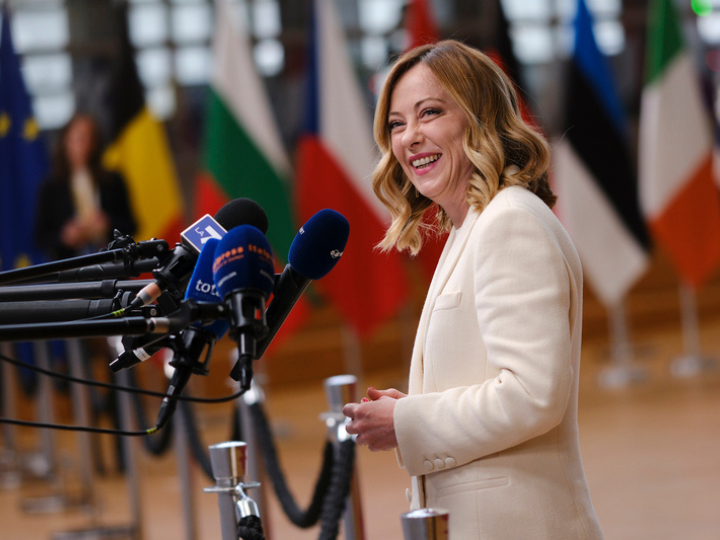by Rajnish Singh
In May 2025, a photo of Albanian Prime Minister Edi Rama kneeling before Italian Prime Minister Giorgia Meloni at the European Political Community (EPC) summit, a gathering of 47 heads of state and government, grabbed headlines around the world.
Meloni appeared bemused, but it’s hard to imagine she didn’t enjoy the gesture. Rama knelt to offer her a birthday gift and a rendition of Tanti Auguri, the Italian version of Happy Birthday, to mark her 48th birthday.
What made the moment especially striking was that it came from Rama, a centre-left leader of Albania’s Socialist Party, to Meloni, the head of Italy’s hard-right Brothers of Italy. It was a warm gesture between ideological opposites—one that symbolised Meloni’s expanding power across the continent and underscored her ability to work pragmatically and effectively with leaders regardless of their political leanings.
In a Europe short on heavyweight leadership, Meloni is emerging as the continent’s most potent political figure. Once dismissed as a fringe nationalist, Italy’s prime minister now holds a powerful position both at home and abroad, while her counterparts in France, Germany, Spain and the UK falter, building momentum and a reputation as the EU’s most stable and strategic player.
She leads a remarkably stable coalition—a political rarity in Rome. Her Brothers of Italy party continues to poll strongly, and her alliance holds close to a parliamentary majority. Her personal approval ratings surpass those of most of her European counterparts, and none of her domestic rivals can match her charisma, much to their despair.
French President Emmanuel Macron has seen his popularity plummet since the snap parliamentary elections following the 2024 European vote, in which he suffered heavy losses to the far right.
Spanish Prime Minister Pedro Sánchez, leader of the Spanish Socialist Workers’ Party (PSOE), is facing significant political challenges following a series of corruption and misconduct scandals that have eroded the credibility of his government.
Friedrich Merz, who became German Chancellor in May 2025 after leading the Christian Democratic Union (CDU) to victory in the February federal election, has faced substantial challenges that have shaped his early tenure.
In the United Kingdom, Prime Minister Keir Starmer’s honeymoon period is officially over, despite some success on the international stage. Domestically, he was dealt a heavy blow when members of his party voted down a key reform central to his policy agenda and government finances.
But it’s not all plain sailing. Italy’s economy suffers from heavy debt and slow growth, limiting its influence. She has, however, compensated with diplomacy. Her alignment with Donald Trump and deft handling of EU–US relations have elevated her status. She has become a transatlantic interlocutor—linking Trump and Ukraine’s President Zelensky, while forging ties with European Commission President Ursula von der Leyen.
In Brussels, Meloni has shelved her early euroscepticism in favour of what she calls “Eurorealism”. She has maintained support for Ukraine despite limited domestic enthusiasm and positioned herself as a central player in the European Conservatives and Reformists (ECR) bloc. In the 2024 European elections, her party gained ground while centrist rivals lost, cementing her growing leverage.
Her appeal extends beyond institutional dynamics. Her blend of cultural conservatism, tough stance on migration, and rhetorical discipline, centred on “God, homeland, family,” resonates with voters disillusioned by technocratic centrism. She has, however, softened her far-right image without abandoning her ideological roots. Her controversial migration deal with Albania has drawn both praise and criticism, but few doubt its political impact. So much so even Danish social democrat Prime Minister Mette Frederiksen, has tried to out flank her on migration!
Challenges, however, loom. At home, coalition partners are growing restless. EU fiscal rules could force unpopular austerity measures. Abroad, her closeness to Trump could backfire with European allies—especially if defence priorities or military support to Ukraine diverges. Italy still falls short of its NATO spending target, and Meloni’s absence from a recent Kyiv summit drew criticism.
While there is history, Meloni’s post-fascist political roots remain a sticking point for some European leaders, complicating her efforts to establish herself as a consensus builder.
In a Europe short on stature, Meloni stands tall. But power is one thing, what she does with it will truly define her.




 By: N. Peter Kramer
By: N. Peter Kramer
